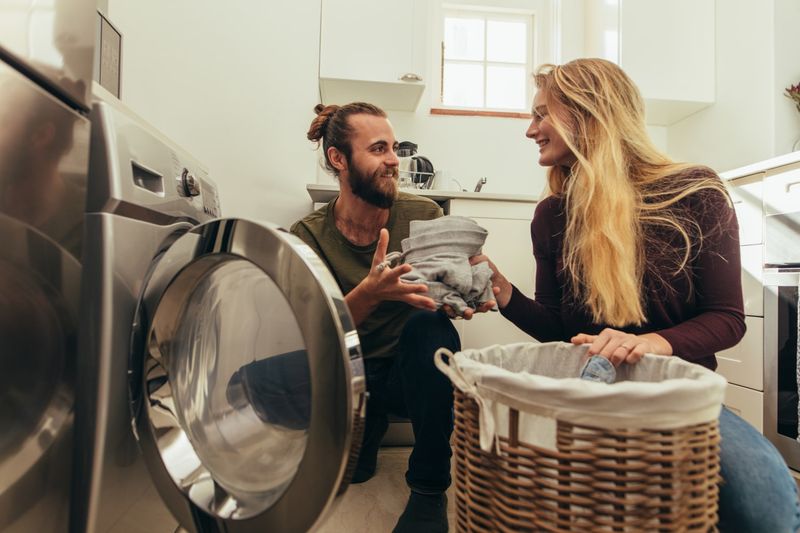20 Relationship Taboos That Actually Keep Older Couples Happier
Not all relationship advice ages well. Some of the so-called rules that people swear by in their 20s?
Older couples who’ve been through real-life ups and downs know better. They’ve discovered that some taboos are actually secret weapons—tools that bring peace, clarity, and unexpected joy.
Here are 20 “relationship taboos” that older, happier couples swear by (even if they once sounded controversial).
1. Sleeping in separate bedrooms

It’s not a sign of trouble—it’s a sign of sleep, peace, and maybe even better intimacy. Think about it: how can you be at your best if you’re tossing and turning all night because of snoring or blanket-hogging? By having separate bedrooms, older couples find they wake up refreshed and ready to enjoy each other’s company.
I know what you’re thinking—isn’t that going to kill the romance? Quite the opposite! The time spent together becomes more intentional and exciting.
Plus, having your own space can make your heart grow fonder, just like when you were dating and couldn’t wait to see each other again. So, next time you hear about separate bedrooms, don’t gasp—consider it a savvy secret to keep the love alive.
2. Not talking about everything

Sometimes, silence is golden. Not every irritation needs to be a discussion. Imagine the freedom in knowing you don’t have to dissect every little thing. Older couples have learned that some things are better left unsaid, allowing the air to clear naturally without the need for endless conversations.
It’s not about bottling up emotions but about choosing battles wisely. In the end, a peaceful coexistence often takes precedence over hashing out every minor grievance.
Trust me, it’s liberating! You save energy for the moments that truly matter, and those silences can be filled with understanding and love. Remember, sometimes just knowing when to let things go is the real key to happiness.
3. Living partially separate lives

Different hobbies, friends, or routines can keep a relationship fresh and respectful. Let’s face it, you don’t have to be joined at the hip to be happy. Older couples find joy in pursuing individual passions and allowing space for personal growth.
Whether it’s taking up a new hobby, joining a club, or even spending time with different friends, living partially separate lives can rejuvenate a relationship. It creates an environment where each partner can freely express themselves and return with new stories, adding excitement to conversations.
So, go ahead, embrace those different interests. You’ll find that space, far from being a wedge, acts as a bridge that brings you closer.
4. Having “me time” every single day

Closeness doesn’t require constant contact. Space fuels long-term happiness. Taking time to yourself each day isn’t selfish; it’s necessary. Older couples swear by carving out “me time” to recharge and reflect. It might be a morning walk, reading a book, or sipping tea in the garden.
This daily ritual doesn’t just benefit the individual, but the relationship as a whole. When you take care of yourself, you bring a more balanced and positive you back to your partner.
And honestly, who doesn’t appreciate a little alone time to gather one’s thoughts or indulge in a favorite pastime? It’s a simple act that keeps the partnership harmonious and thriving.
5. Keeping separate finances

It’s not about secrecy—it’s about autonomy, boundaries, and respect. Money can be a tricky subject, but older couples often find peace in managing finances separately. It allows each partner to maintain some independence while respecting the shared goals of the relationship.
Think of it as setting healthy boundaries that prevent financial disagreements and foster mutual respect. It also means fewer arguments over spending habits and more room for personal choices. You’re not just sharing a life; you’re also supporting each other’s individual strengths and needs.
So, if you think combining everything is the only way to prove fidelity, think again. Sometimes, a little financial space can keep the peace and the love flowing.
6. Not being each other’s everything

Your partner isn’t your therapist, social circle, and spiritual advisor. And that’s healthy. Older couples know that expecting one person to fulfill every role is unrealistic and burdensome. By seeking support and joy from a variety of sources, they create a network of relationships that enrich their lives.
It’s about understanding that one person can’t be your all-in-one. This approach takes the pressure off and allows each partner to grow independently. Sharing experiences with friends or seeking advice from different people adds depth to the relationship.
Embrace the idea that it’s perfectly okay to have separate circles and interests. It keeps love fresh and expectations realistic.
7. Physical intimacy happens less often—but feels more meaningful.

Quality > quantity. And pressure-free intimacy is a win for both. Older couples often discover that less frequent but more meaningful physical connections enhance their relationships. It’s not about keeping track but cherishing moments when intimacy happens.
As life progresses, so do relationships, and what once was a fiery passion evolves into a deeper, more fulfilling bond. It’s about the little gestures, the looks, and the shared laughs that make those intimate moments special.
When the pressure to perform fades, what remains is genuine affection and love. If you find yourself counting less encounters but feeling more connection, know that you’re in the sweet spot of seasoned romance.
8. Avoiding conflict sometimes

Not every battle needs to be fought. Picking peace can be powerful. Older couples often master the art of letting go of minor disagreements to maintain a harmonious relationship. It’s about knowing when to speak up and when to let things slide.
Sometimes, the peace of mind and the warmth of companionship outweigh the need to be right. By avoiding unnecessary confrontations, couples preserve energy for the moments that truly matter.
It’s an unspoken agreement to prioritize love over ego, which strengthens the bond and fosters long-lasting happiness. So, next time you’re tempted to argue over trivial matters, consider choosing peace instead.
9. Making jokes about each other (lovingly)

A little humor softens old annoyances—and helps couples not take themselves too seriously. Older couples often have a treasure trove of inside jokes and playful banter that add zest to their relationship. It’s not about mocking but lovingly teasing in a way that acknowledges quirks and deepens affection.
These jokes become a language of their own, a way to navigate life’s ups and downs with a smile. Humor can diffuse tension, create bonds, and remind each partner of their shared journey.
Enjoy those little jokes, laugh at the quirks, and keep the atmosphere light and joyful. It’s laughter, after all, that’s the heartbeat of a happy relationship.
10. Taking solo vacations

Time apart makes the reunion sweeter. And it recharges you both individually. Older couples often find that solo vacations offer a unique opportunity to explore personal interests and return refreshed. It’s about the adventure of self-discovery and the excitement of coming back with stories to tell.
Imagine the joy of reuniting with a partner after a solo trip, filled with newfound energy and appreciation. The time apart can enhance understanding and remind both partners of their individuality.
So, don’t feel guilty about taking that solo trip. Embrace it as a chance to grow personally and as a couple. The reunion will be all the more special.
11. Spending holidays separately sometimes

Extended family isn’t always peaceful. Setting boundaries can save your sanity and your marriage. Older couples sometimes choose to spend holidays apart to maintain harmony and honor individual traditions. It’s about creating a balance where each partner feels supported in their personal choices.
Whether it’s visiting different family members or embracing unique customs, this approach can reduce stress and enhance personal well-being.
The time apart during holidays can actually strengthen the bond, as both partners return with stories and renewed appreciation. If you find yourself facing holiday stress, consider setting boundaries and spending some time apart. It might just be the break you both need.
12. Saying “I need space” without guilt

It’s not rejection. It’s self-awareness—and a sign of emotional maturity. Older couples understand that needing space is a natural part of a healthy relationship. It’s about recognizing when you need time to recharge and reflect, and communicating that need without fear of hurting your partner.
This honesty fosters trust and respect, allowing each person to care for their emotional well-being. Giving each other space can lead to greater closeness and understanding in the long run.
It’s a gentle reminder that you’re two individuals who choose to be together. Don’t shy away from asking for space when you need it. It’s a nurturing act for both.
13. Not doing everything together

Shared values matter more than shared schedules. Older couples often find joy in pursuing separate activities that fulfill their individual passions. Whether it’s gardening, painting, or any other hobby, having time apart allows each partner to bring something new and enriching to the relationship.
This balance between togetherness and independence keeps the bond strong and vibrant. It’s about recognizing and respecting each other’s needs for personal growth and self-expression.
So, go ahead and indulge in your separate pursuits. You’ll find that these experiences bring you closer and keep the relationship exciting.
14. Skipping date night (and not feeling bad about it)

Routine is comforting. You don’t have to “perform” love every Friday at 7 p.m. Older couples find contentment in the everyday moments rather than scheduled date nights. It’s the idea that love isn’t just in the grand gestures but in the small, consistent acts of care and understanding.
Whether it’s cooking dinner together or enjoying a quiet evening at home, these moments are the real building blocks of a strong relationship.
Letting go of the pressure to have a perfect date night every week allows love to grow naturally and authentically. Embrace the simplicity of routine, and find joy in the little things.
15. Splitting chores in unconventional ways

Forget “fair.” Do what works. If one cooks and the other handles bills—great. Older couples often find that breaking away from conventional chore division leads to a more harmonious home life. It’s about recognizing each other’s strengths and preferences, allowing for a system that works for both.
Flexibility in managing household tasks reduces stress and fosters cooperation. Instead of arguing over who does what, there’s a mutual understanding that every contribution is valuable.
This unconventional approach makes everyday life smoother and more enjoyable. So, don’t be afraid to shake things up. Find what works for you and embrace it.
16. Not oversharing your inner world

Some thoughts stay private—not because you’re hiding, but because you’re whole on your own. Older couples understand the importance of maintaining individual inner worlds. It’s a gentle acknowledgment that not everything needs to be shared to be understood.
This doesn’t mean keeping secrets but cherishing personal reflections and insights. By holding onto some private thoughts, each partner remains an intriguing and evolving individual within the relationship.
It’s a balance that keeps love fresh and prevents stagnation. Trust in your ability to be both open and private. It adds depth to the relationship and keeps it lively and interesting.
17. Letting go of the pressure to be romantic all the time

Love shows up in grocery runs, warm silence, and folding laundry without being asked. Older couples recognize that romance isn’t confined to candlelit dinners or extravagant gestures. It’s in the everyday, ordinary moments that love truly thrives.
The pressure to constantly be romantic fades, replaced by an appreciation for the simple acts of kindness and care. These are the gestures that build a solid foundation and keep the flame alive.
Embracing this perspective allows couples to relax and enjoy each other’s company without expectation. Cherish those small, unassuming moments. They’re the real expressions of enduring love.
18. Spending quiet nights doing “nothing” together

Peaceful co-existence can be just as intimate as candlelit dinners. Older couples often find joy in simply being together without any structured activity or entertainment. It’s about the comfort of knowing that even in silence, there’s a deep connection.
These quiet nights are opportunities to relax and recharge, free from the pressures of constant activity. They offer a chance to enjoy the simplicity of a shared life.
It’s a gentle reminder that sometimes, doing nothing together can be the most fulfilling experience. So, embrace those quiet nights and let them remind you of the richness of just being.
19. Taking breaks from each other during tense times

Pressing pause before saying something regrettable? Incredibly wise. Older couples often realize the value of taking a step back during tense times to prevent heated arguments. It’s about recognizing the need for a cooling-off period before emotions get the better of you.
This pause allows for reflection and a chance to return with a clearer perspective and renewed understanding. By choosing to take breaks during conflicts, couples can avoid unnecessary hurt and maintain a loving atmosphere.
It’s a strategy that fosters patience and respect, ultimately strengthening the relationship. Don’t hesitate to take a breather when needed. It’s a wise move for lasting love.
20. Choosing to stay not because you need them—but because you want to

That’s what real love looks like: freedom, presence, and the daily decision to stay connected. Older couples often find that the strength of their relationship lies in choosing each other every day, not out of necessity but out of genuine desire.
It’s about the freedom to be independent yet deeply connected, finding joy in the partnership as a choice rather than obligation.
This mindset brings a profound sense of security and happiness, knowing that you are loved not because you have to be but because your partner truly wants to be with you. It’s the ultimate expression of commitment and love.







